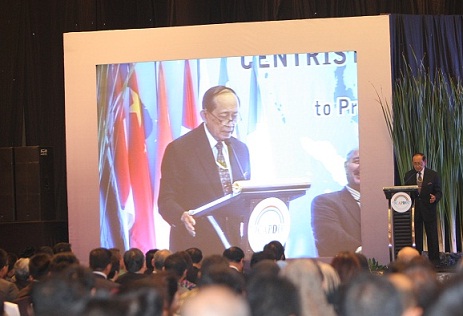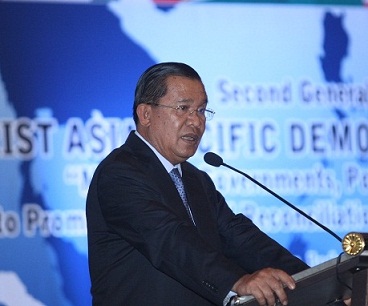By Ellen Tordesillas,VERA Files
 MAKASSAR, Indonesia—Former President Fidel V. Ramos Monday called on rich countries to reduce their budget for deadly weapons and realign resources for public safety, including navigation in the disputed waters in the South China Sea.
MAKASSAR, Indonesia—Former President Fidel V. Ramos Monday called on rich countries to reduce their budget for deadly weapons and realign resources for public safety, including navigation in the disputed waters in the South China Sea.
“Clearly, an Asia-Pacific peace must also be built on an understanding among the most affluent, and the most powerful countries in our part of the world—notably the United States, China, Japan, Russia, South Korea, Australia-New Zealand, and the ASEAN 10 Bloc—to moderate the procurement of lethal weapons in favor of public safety, South China Sea/West Philippine Sea/East Asia, early warning systems, and search-rescue capabilities,” Ramos told the 2nd General Assembly of the Centrist Asia-Pacific Democrats International (CAPDI) at this port city of South Sulawesi.
CAPDI, an organization of political parties, people’s organizations, think tanks, interfaith organizations, business leaders, academe, eminent persons and media, tackled during the two-day meeting the promotion of peace and reconciliation and climate change in Asia.
Ramos, who is CAPDI’s honorary chairman, said he finds it senseless the United States having some 8,500 nuclear warheads and Russia more than 1,000 “ready to go” and other countries also having weapons of mass destructions when “you need only one to start World War III.”
Former Seychelles president James Mancham elaborated on Ramos’ call: “In a nuclear war, we will all perish.”
Instead of nuclear weapons, Mancham said, “we should promote trust.”
Ramos said, “An Asia Pacific peace will endure only if it is based on the balance of mutual benefit rather than on the balance of power…Let us not be competitive to dominate each other but to prosper together.”
Former House Speaker Jose de Venecia, CAPDI president, said as the balance of power shifts from West to East, the organization will strive to help prevent the outbreak of a new Cold War in the Asia Pacific “by encouraging the peaceful rise of every emerging great power; in the nations of the G-20 and in BRICS, and supporting popular movements that advocate peaceful coexistence among the East Asian states.”
G-20 is a grouping of 20 economies that account for more than 80 percent of the gross world product. Indonesia is the only Southeast Asian country that is a member of the G-20.With the exception of Russia, members of BRICS—an acronym for Brazil, Russia, India, China and South Africa—are all newly industrialized countries with large, fast-growing economies.
Cambodia Prime Minister Hun Sen, also CAPDI honorary chairman, urged nations to “encourage a shared responsibility through government-to-government and party-to-party cooperation” to attain peace and reconciliation.
Participants signed the Makassar Declaration which recommended among others “the establishment of an inter-governmental working group to create instruments of common security, common stability, and common prosperity that would rule out the use of force in Asia-Pacific, which shall complement the ASEAN’s Treaty of Amity and Cooperation.”
They included Ramon Ang, San Miguel Corp. president; Agung Laksono, Indonesia’s coordinating minister for People’s Welfare, and Nepal’s former prime minister Madhav Kumar.
(VERA Files is put out by veteran journalists taking a deeper look at current issues. Vera is Latin for “true.”)
